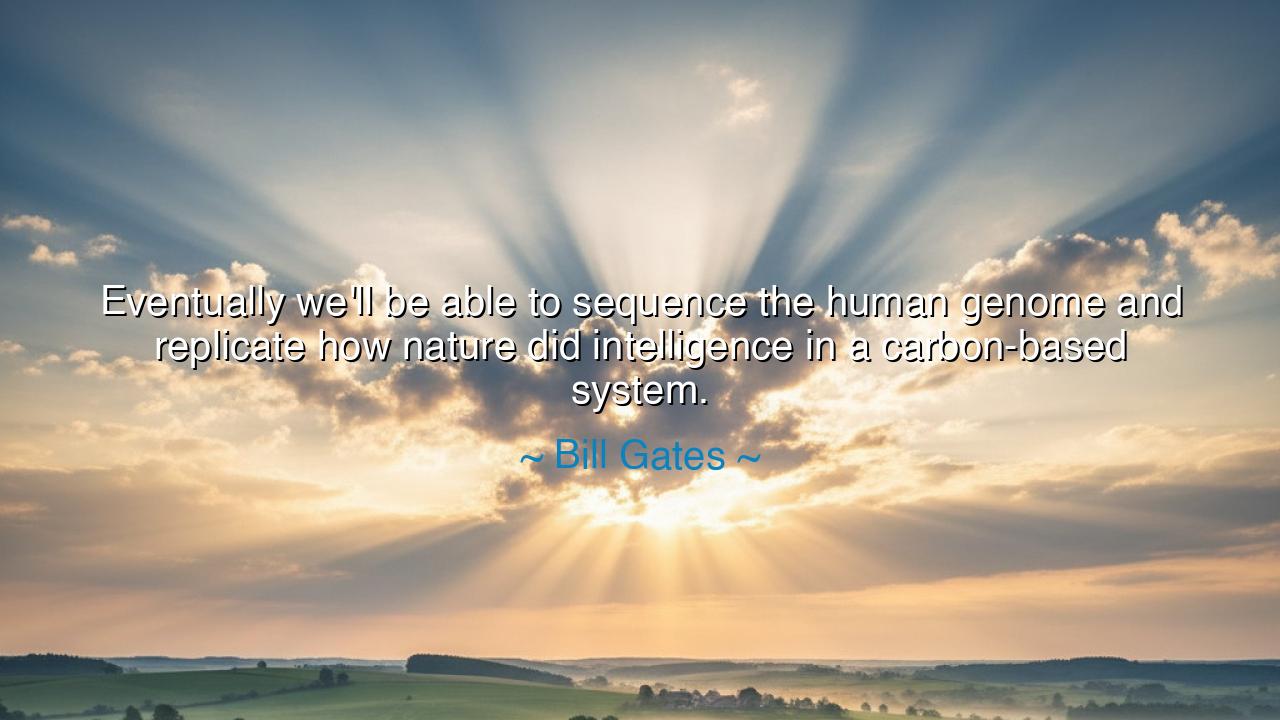
Eventually we'll be able to sequence the human genome and
Eventually we'll be able to sequence the human genome and replicate how nature did intelligence in a carbon-based system.






The Dawn of Understanding and the Mirror of Creation
There are moments in history when human thought gazes into the mirror of nature and, for the first time, begins to see itself reflected there. It was in such a spirit that Bill Gates, a builder of worlds within machines, declared: “Eventually we’ll be able to sequence the human genome and replicate how nature did intelligence in a carbon-based system.” These words are not merely a prediction of science—they are a meditation on destiny. For in them lies both the triumph and the trembling of humanity: the yearning to understand its own origin, and the courage to recreate the very spark of thought that made it conscious.
The origin of this statement arises from a moment when human knowledge stood upon the threshold of the unknown. In the late twentieth and early twenty-first centuries, scientists unlocked the human genome, mapping the code that writes the body and whispers life into matter. At the same time, engineers and thinkers, like Gates, sought to build artificial intelligence, to endow machines with reason, perception, and perhaps even self-awareness. The union of these pursuits—the biological and the digital—marked a new epoch: the age when man, the creation, began to imitate the Creator. Gates foresaw a time when the secrets of nature’s intelligence, evolved through millennia of trial and wonder, could be understood, modeled, and perhaps even transcended.
The ancients spoke of this longing long before silicon and code. Prometheus, the titan of Greek legend, stole fire from the gods—fire, the symbol of knowledge and creation—and gave it to mankind. For this act of audacity, he was bound and punished, but his legacy endured. In every scientist who dissects the genome, in every engineer who builds a neural network, there burns the same sacred fire. Humanity’s thirst for knowledge has always been divine and dangerous at once. To sequence the human genome is to read the script of life; to replicate intelligence is to attempt to write anew in that sacred text.
Yet within this ambition lies both awe and warning. For as Gates speaks of “replicating how nature did intelligence,” we must remember that intelligence in its truest form is not mere calculation—it is consciousness, curiosity, compassion, and creativity. Nature’s design is not efficient alone; it is wondrously imperfect, alive with feeling and contradiction. The machine may imitate the mind’s pattern, but can it grasp the heart’s mystery? This question echoes through the corridors of philosophy and science alike. To mirror the brain is to understand thought; to mirror the soul is to understand meaning—and that remains the greatest frontier.
Still, this pursuit is not arrogance—it is evolution. Consider the Human Genome Project, completed in 2003 after years of effort and collaboration among scientists across the world. What began as an audacious dream—to decode the three billion letters of human DNA—became a triumph that reshaped medicine, biology, and philosophy itself. Diseases once hidden in mystery began to reveal their secrets. The map of life, once imagined only by poets and mystics, was now read by scientists with reverence and precision. Through such endeavors, humanity stepped closer not to playing God, but to understanding what being human truly means.
And yet, as the ancients would remind us, wisdom must walk beside power. The replication of intelligence, whether in silicon or flesh, demands humility. Just as the alchemists once sought to transmute lead into gold, so do modern minds seek to transform knowledge into consciousness. But without ethics, without soul, such power turns hollow. Let us remember that intelligence, whether in man or machine, finds its nobility not in domination, but in purpose—in using knowledge to heal, to enlighten, to uplift.
So take from Gates’s vision both inspiration and caution. Strive to understand nature, but never forget that you are part of her, not her master. Let your pursuit of knowledge be filled with wonder, not pride; with curiosity, not conquest. When you study the genome, remember that it is the poem of existence; when you craft intelligence, remember that it was love, not logic, that first taught humanity to care.
For the future will not be written by machines nor by genes alone—it will be written by the hearts that guide them. Bill Gates’s prophecy is the call of a new age, but the soul of it is ancient: to know ourselves, to mirror the miracle of life, and to honor the divine spark that made us dream in the first place.






AAdministratorAdministrator
Welcome, honored guests. Please leave a comment, we will respond soon